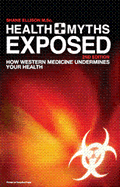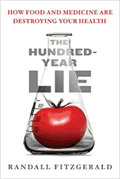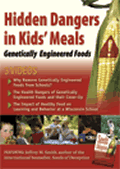Other Guest Articles:
Jury Rights! Jury
Nullification
Constitutional
Tools No
Longer Valid
CODEX PUTS INDUSTRY INTERESTS BEFORE CONSUMERS - AGAIN
By
Ingrid
Franzon, Dr. Robert Verkerk,
and Dr. Wong Ang Peng
November
23, 2006
NewsWithViews.com
Forty-five countries and 24 international non-governmental organizations completed a week of deliberations at the 28th session of the United Nations-backed Codex nutrition committee, held in Chiang Mai, Thailand.
This year�s meeting of the committee, relocated from its heartland in Germany, unsurprisingly saw a strong turnout from Asian countries. However, cultural factors may have hindered interventions, leaving the European Commission and United States delegations to dominate proceedings under the chairmanship of Germany�s Dr Rolf Grossklaus. The re-location from Germany to Thailand also seemed responsible for the 30% and 32% reduction in attendance, between 2005 and 2006, from national delegations and non-governmental organizations respectively.
The Codex Committee on Nutrition and Foods for Special Dietary Uses (CCNFSDU), one of 27 Codex Alimentarius Commission committees, develops international guidelines and standards for foods including infant formula, cereal-based foods for infants, gluten-free foods and dietary supplements. Committee procedure is tightly controlled, and although consensus voting provides the mechanism for agreement of texts, organized pacts between national delegations frequently allow viewpoints biased in favor of industry to be pushed through, even in the face of fierce opposition from consumer-led international non-governmental organizations (INGOs) such as the US-based National Health Federation (NHF).
The NHF delegation at Chiang Mai, led by Ingrid Franzon from Sweden, initiated heated discussions at this year�s meeting that brought to light the need to take better consideration of the consumers� metabolic, national and geographic differences. Also on the NHF�s delegation this year were Dr Wong Ang Peng from Malaysia and NHF�s scientific advisor, Dr Robert Verkerk, from the UK.
The agenda items of particular interest to NHF at this meeting included discussions on the World Health Organization�s Global Strategy on Diet, Physical Activity and Health, nutrient risk assessment, health claims and Nutrient Reference Values (NRVs), the latter of which currently seems the most likely candidate to replace Recommended Daily Allowances of vitamins and minerals on food, dietary supplement and functional food labels. The NHF has been taking an active part in the Working Group on risk assessment, a discipline which is set to become the key scientific justification for potential future bans on dietary supplements. Current risk assessment methods are flawed and biased, so methodologies that are scientifically rational are urgently required, and were central to the NHF's interventions during this year�s meeting.
With the discussions on infant formula and foods occupying around 75% of the committee�s time, critical agenda items 7, 8 and 9 on health claims, NRVs and risk assessment did not commence until 7:23 pm on the final evening of deliberations, which closed shortly after 9 pm. It seems that the continued low priority for these agenda items over successive CCNFSDU meetings is perhaps being engineered by the Codex Secretariat in order to allow the European Commission to progress its own regulations in these areas, so that once completed these can act as models for future Codex standards.
Ingrid Franzon said, �This year�s meeting can best be described as an industrial and geographic polarization. It is deeply disheartening to see the views of delegations from small countries, or those of INGOs like the NHF, backed by many thousands of consumers, being trampled on by the EC bloc and other big countries, who seem much more concerned with the problems of big business rather than the interests of consumers.�
Dr Wong, who has previously attended a CCNFSDU meeting as part of the Malaysian delegation, added, �Fluoride and sugar in foods were two glaring issues at this year�s meeting. It seems without doubt that industrial interests are taking precedence over consumer interests. Current science, and even common sense, would say it is nonsense to include fluoride and extra sugar in foods, especially those destined for children. It seems that the European Commission, the USA, Germany and some other European delegates know no shame, and as a result we now know better than ever before that the CCNFSDU�s purported remit of �consumer protection� is hollow.�
The NHF team stimulated some two hours of discussion following its intervention over the need to stipulate more detailed specifications for �safe water� to which infant formula is added. Safe water is a concept not well understood by many parents who use infant formula, and contamination continues to result in millions of cases of infant death and sickness annually. Interestingly, the Chairman attempted to shut down the discussion following the NHF intervention by saying, �Safe, more safe, most safe, what is the difference?� but fortunately the International Baby Food Action Network (IBFAN), the International Association of Consumer Food Organizations (IACFO) and other INGOs, who were also more concerned with consumer interests, fought hard to reach a compromise on wording in the face of strong opposition from national delegations, who, seemingly, primarily voiced the views of industry.
Dr Robert Verkerk, the NHF�s scientific advisor, was deeply unhappy with the allocation of time to key agenda items, saying, �I hope the 10 minutes given over to risk assessment and health claims apiece do not reflect this Committee�s interest in these hugely important subjects, both of which will have a big bearing on consumer health and freedom of choice in years to come. We hope, however, that useful discussions in the Working Group on Risk Assessment, with which we have been closely involved, will be reflected in the committee�s final report.�
This year�s CCNFSDU proceedings have once again shown just how difficult it is to make changes to international guidelines and standards, when such changes are motivated by consumer interests and natural health issues rather than industry. Fortunately, however, Codex procedures move slowly, and with continued, well thought-through and scientifically backed inputs, there are still opportunities for consumer voices to be heard so that positive changes to texts can be sought.
Nevertheless, the outcome of this meeting underscores yet again the importance of all freedom loving individuals, especially Americans, of opposing the creation of so-called "free trade areas" and regional blocs, such as the proposed North American Union.
The recent evidence of the European Union project, for example, shows us that the creation of "free trade areas" and regional blocs is merely a prelude to the dismantling of the political and legal systems of participating nations, and the replacing of these with a hemispheric government. As such, the passing of the European Union's highly restrictive and Codex-compliant Food Supplements Directive, in 2002, should serve as a warning to Americans as to what could happen if we allow Congress to abandon the United States of America as an independent country. Just as the relatively liberal dietary supplement laws of the UK were overridden by the Codex-compliant EU Food Supplements Directive (as a result of successive treaties that the British Government had signed with its European neighbors), participation in the North American Union could similarly lead to U.S. dietary supplement law (i.e. DSHEA) becoming susceptible to Codex-complaint harmonization with the more restrictive dietary supplement laws of Canada and Mexico.
|
Subscribe to the NewsWithViews Daily News Alerts! |
In short, while the unelected bureaucrats from the FDA who attend Codex meetings are ultimately not accountable to us, our Senators and Congressmen most certainly are. The National Health Federation therefore recommends that all citizens should keep these facts in mind when voting in their general elections.
� 2006 - NHF - All Rights Reserved
Sign Up For Free E-Mail Alerts
E-Mails are used strictly for NWVs alerts, not for sale
National Health Federation was established in 1955, as a consumer-education, health-freedom organization working to protect individuals' rights to choose to consume healthy food, take supplements and use alternative therapies without government restrictions. With consumer members all over the world, and a Board of Governors and Advisory Board containing representatives from 6 different countries, the Federation is unique in being the only consumer health freedom organization in the world to enjoy official observer status with the Codex Alimentarius Commission.
National
Health Federation
P.O. Box 688,
Monrovia, CA 91017 USA
Voice 1 (626) 357-2181
Fax 1 (626) 303-0642
Website: www.thenhf.com
E-mail: contact-us@thenhf.com
Dr Wong, who has previously attended a CCNFSDU meeting as part of the Malaysian delegation, added, �Fluoride and sugar in foods were two glaring issues at this year�s meeting. It seems without doubt that industrial interests are taking precedence over consumer interests.












